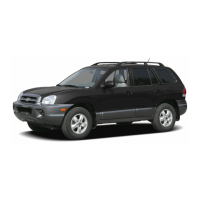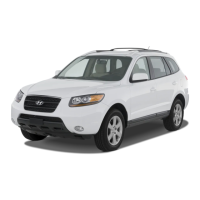Do you have a question about the Hyundai Entourage 2007 and is the answer not in the manual?
Explains the layout and conventions of the owner's manual for effective use.
Details the types of gasoline and octane ratings required and recommended for optimal vehicle performance.
Provides recommendations for the first 1,200 miles to ensure economical operation and durability.
Identifies and explains the various controls and features located within the vehicle's interior.
Details the layout and function of the various gauges, indicators, and controls on the instrument panel.
Explains the master key, its operations, and the importance of the key code for duplication.
Describes the functions of the remote keyless entry system, including locking, unlocking, and tailgate/door operation.
Explains how to operate the door locks from both inside and outside the vehicle, including child-protector locks.
Details the operation of the power windows, including the driver's master controls and window lock switch.
Provides instructions for adjusting front and rear seats, including forward/backward, recline, height, and stowing.
Covers seat belt precautions, proper usage for different occupants, and care of the seat belt system.
Explains the SRS system, components, operation, and safety precautions for front, side, and curtain airbags.
Discusses power steering operation, tilt steering adjustment, and cruise control system integration.
Explains the adjustment, folding, and heating functions of the outside rearview mirrors and the day/night rearview mirror.
Identifies and describes the function of each gauge, indicator, and control on the instrument panel.
Explains the speedometer, odometer, tachometer, and engine temperature gauge.
Details how to use the trip computer to display information like range, driving time, fuel consumption, and outside temperature.
Provides essential checks, key positions, and starting procedures for safe vehicle operation.
Guides on starting the engine, transaxle operation, shift lever positions, and sports mode.
Explains how to set, cancel, and use the cruise control system for maintaining constant speed.
Covers power brakes, actions in case of failure, parking brake, disc brake wear, and ABS functionality.
Explains the ESC system's function, operation modes, and driving precautions for maintaining vehicle control.
Describes the operation, conditions, and types of warning sounds for the back warning system.
Offers driving suggestions for fuel economy and advice for hazardous conditions like snow, ice, and rain.
Covers essential tips for trailer towing, hitches, safety chains, trailer brakes, and vehicle load limits.
Covers hazard warning flashers and troubleshooting steps for engines that won't start or turn over slowly.
Details jump-starting procedures, battery safety, and steps to take when the engine overheats.
Explains TPMS indicators, malfunction warnings, and procedures for changing a tire with TPMS.
Provides step-by-step instructions for removing, storing, and replacing a spare tire, including jacking and wheel nut procedures.
Gives guidelines for emergency towing, including recommended procedures and precautions for towing with or without dollies.
Outlines owner responsibilities, services, and normal/severe maintenance schedules based on mileage and conditions.
Identifies key components and fluid reservoirs located within the engine compartment for inspection.
Guides on checking and maintaining engine oil, coolant, washer fluid, power steering fluid, and brake fluid levels.
Details the replacement procedure for the air cleaner element and maintenance for wiper blades.
Explains fuse types, replacement procedures, fuse panel locations, and battery safety precautions and recharging.
Covers tire care, recommended inflation pressures, tire rotation, replacement, and wheel alignment.
Guides on replacing various exterior and interior light bulbs, including headlight aiming adjustment.
Explains causes of corrosion and provides tips for protecting the vehicle's body, interior, and finish.
Explains the crankcase, evaporative, and exhaust emission control systems and precautions for vehicle modifications.
Identifies important labels, VIN, tire specifications, and refers to warranty coverage details.
Provides Hyundai contact information and instructions for reporting safety defects to NHTSA.
Outlines the binding arbitration agreement for resolving warranty-related disputes, including revocation process.
Lists vehicle dimensions (length, width, height) and the wattage of various interior and exterior light bulbs.
Specifies tire sizes, inflation pressures, lug nut torque, and recommended fluid capacities for the vehicle.
| Brand | Hyundai |
|---|---|
| Model | Entourage 2007 |
| Category | Automobile |
| Language | English |











